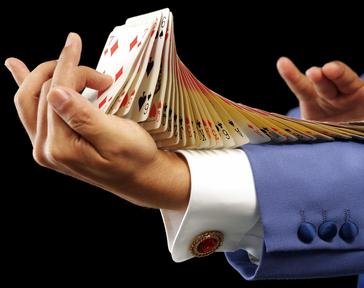Quiz Answer Key and Fun Facts
1. A classic type of magic trick involves producing something from nothing, seemingly out of thin air. Which of these magical accoutrements would you use to perform such a trick?
2. The opposite of magical production is causing something to vanish. Usually this would be something small like a coin, a bird, or maybe an assistant, but in 1983, what did David Copperfield cause to disappear live on television?
3. Sometimes magicians transform one object into something else, or even a person into an animal! In the trick 'Cold as Ice', the magician pours water into a cup, then turns the cup over to have just a block of ice drop out! How is this accomplished?
4. The illusion of restoration is when something (a rope, a dollar-bill, etc.) is seemingly destroyed (cut up or torn into pieces), and then 'magically' reconstituted. What well-known restoration trick was patented by Horace Goldin in 1923?
5. When a person or an object is magically moved from one location to another, it is referred to as teleportation. What is it called when two people/objects magically exchange places?
6. Escaping from seemingly inescapable situations is another hallmark of magicians. One of the greats, Harry Houdini, first became well-known through escaping what devices?
7. Many magicians like to do this illusion in their shows, whether they do it themselves or make an object or another person do it. What?
8. The category of magic illusion that involves one (solid) object going through another (solid) object is called 'Penetration'.
9. Another category of magic used by stage magicians is one where the performer is able to determine choices made by audience members, or exact amounts of pocket change, or some other seemingly impossible outcome. What is this called?
10. In order for magicians to maintain their illusions and to continue to amaze audiences young and old, what should they do?
Source: Author
reedy
This quiz was reviewed by FunTrivia editor
kyleisalive before going online.
Any errors found in FunTrivia content are routinely corrected through our feedback system.

